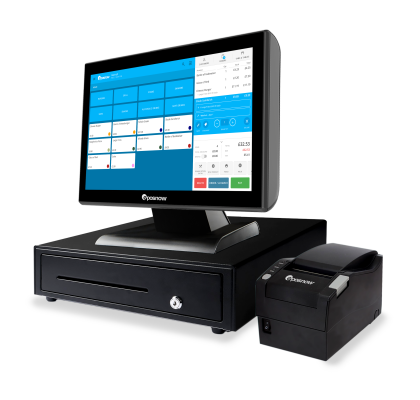What Is Non-Essential Retail?
Especially in the wake of the pandemic, there has been a lot of discussion surrounding non-essential retail. But what is this concept, and how does it affect businesses and consumers?
While many people may assume that non-essential retail is simply a matter of personal preference, there are actually several important factors that can affect whether or not a retailer falls into this category. Luckily, here at Epos Now, we've been doing our own research on what non-essential retail really means - find out for yourself below.
What is the definition of 'non-essential' in retail terms?
At its core, non-essential retail refers to businesses that provide goods or services that are not considered essential to the general public. In order to be considered non-essential, a retailer must typically offer products or services that most people can live without, or at least significantly reduce their reliance on.
Who defines non-essential retail?
Technically, since personal perspective can be said to determine whether or not a business is non-essential, it could be said that non-essential is impossible to define since some people may see a typical 'non-essential' retail business as an essential part of their lifestyle.
However, there are a few factors that do affect whether or not a retailer is considered non-essential, such as the type of products they sell, their target audience, and the overall economic climate. Identifying essential retail businesses that offer products or services which are needed by the general public can also start to give a clearer picture of what non-essential retail looks like.
How does non-essential retail affect customers?
Non-essential retail plays an important role in today's consumer landscape, as it caters to our desire for instant gratification and the need for self-expression. Whether we're buying clothes, cosmetics, home goods or gifts for loved ones, non-essential retailers give us the opportunity to express who we are and what we value.
Looking for your next essential business management tool?
Epos Now solutions provide state of the art retail technologies, syncing with integrations to boost local inventory advertising, loyalty programs, email and SMS customer mailing and more.
Epos Now can help you boost your retail or hospitality business from one, cloud-based system regardless of your business size.

How does being named 'non-essential' affect businesses?
The effects of being named a non-essential retailer can be significant, and often negative. For example, during times of crisis - like the recent pandemic - non-essential businesses may be forced to close their doors temporarily as government officials attempt to limit the spread of the disease.
Non-essential retail businesses are often among the first to suffer, as people tighten their spending and focus on more essential items in times of need.
This can obviously have a major impact on revenue and both employee morale and retention, as businesses in this category typically rely more heavily on foot traffic and consumer spending.
What are the benefits of being a non-essential retailer?
With careful planning and effective marketing strategies, non-essential retailers can still thrive during times of uncertainty. By focusing on their core offerings and identifying their target audience, these businesses can better position themselves to weather any economic storms that come their way.
Overall, non-essential retailers that have loyal and engaged customers can continue to thrive by prioritising exceptional customer service and quality, offering free or discounted shipping options, and staying on top of the latest trends in their respective industries. For example, many non-essential retailers are offering virtual services such as online consultations, shopping or fitness classes, or home delivery to keep up with the changing needs of their customers.
What are some examples of non-essential shops?
While there is no concrete definition for non-essential stores, some common examples of businesses deemed as non-essential include:
Clothing stores:
While we might initially consider clothes as essential, most of us have a wardrobe full of items we don't necessarily need. In fact, the average person only wears 20% of the clothes they own[1]! So from high-end designer boutiques like Gucci and Prada to fast-fashion retailers such as PLT and H&M and Zara, the truth is that the clothing industry is essentially... non-essential.
Cosmetic stores:
Similar to clothes, cosmetics are often seen as a necessary evil, rather than an outright essential. However, with the rise of social media and influencers, the pressure to look perfect has never been higher, which has led to increased sales of cosmetics, despite the fact that many people can get by just fine without them.
 Home decor stores:
Home decor stores:
As more and more people adopt a minimalist lifestyle, the need for excess home decor has decreased, making stores like Ikea non-essential retailers.
While we might feel the need for new pillows or curtains for our homes to feel complete, these items are often viewed as luxuries rather than absolute necessities.
Department stores:
Department stores are a type of retail store that offer a wide range of products, from clothes and cosmetics to home goods and electronics. In recent years, the rise of online shopping has led to the decline of department stores, as consumers can now get everything they need with just a few clicks.
Jewellery stores:
While some people view jewellery as a necessary accessory, the truth is that it is hailed worldwide as a luxury item. In fact, according to a study by Bain & Company, the global jewellery market is worth USD $250 billion (NZ $400 billion), making it one of the most lucrative non-essential retail industries.
Gift shops:
Gift shops are often seen as non-essential simply because they sell items that are not meant to be used or consumed, such as cards, candles and souvenirs. However, many people view these products as essential staples of any celebration, such as birthdays and weddings, making gift shops a vital part of the retail landscape.
Luxury goods stores:
Since the term "luxury" is often used to describe items that are expensive but not essential, luxury goods are non-essential by definition. These stores sell items that are coveted for their exclusivity and high price tags, such as designer handbags, watches and clothing.
A powerful POS system that's essential for bettering your retail business
Point of sale systems are the backbone of retail businesses for a number of reasons. Designed to work as a complete business management system, Epos Now allows you to control all aspects of your company from one cloud-based system.
- Review auto-generated profitability reports based on individual product performance, trending items, best and worst sellers.
- Multi-award-winning inventory management that syncs sales across multiple channels and ecommerce platforms.
- Customer management systems that save customer contact details and shopping preferences for more targeted marketing.
- Integrations with over 100 apps including marketing, accounting, bookkeeping, and loyalty program apps.
Are you still browsing for information about non-essential retail? We'd love to hear from you!




